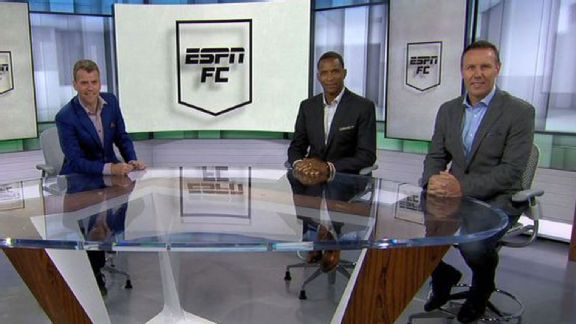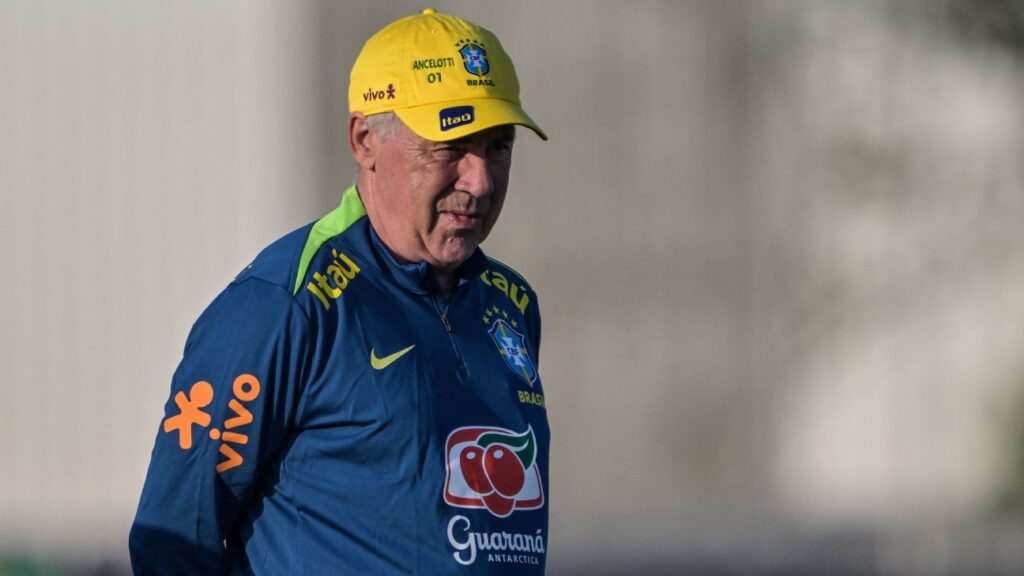On May 24, Carlo Ancelotti was still in charge of Real Madrid. On May 25, he took the long flight across the Atlantic so that on May 26 he could be presented to the world’s media as Brazil’s new coach and name his squad for CONMEBOL World Cup qualifiers at Ecuador and vs. Paraguay.
On May 27, he was at the Estádio Olímpico Nilton Santos in Rio de Janeiro to watch Botafogo’s Copa Libertadores match against Universidad de Chile. On May 28, he was checking out the Seleção’s training facilities in the hills outside the city before catching Flamengo’s match against Deportivo Táchira at the Maracanã.
Ancelotti has been throwing himself into his new job with a verve that belies the fact that he turns 66 next week. In his own low-key way, he exudes the enthusiasm of an 11-year-old — the age at which he has his first memories of the FIFA World Cup. It was Mexico ’70, and his native Italy had come through an epic semifinal against West Germany.
“We were excited to play the final against Brazil,” he recalled. “But Brazil were really strong, with Pelé, Jairzinho, Tostão, Rivelino, Gérson, Clodoaldo. Italy tried hard — it was 1-1 at halftime — but [Brazil] won 4-1. It was the first time I realized how Brazilian players were talented.”
Now that talent is at his disposal as he goes in search of his own World Cup dream. Ancelotti has been a top-class club coach for so long that it is easy to forget his history, and how much of it is bound up with the World Cup.
“I’ve had three experiences with the tournament,” he said. “In 1986, I was a player.” It did not go well, and Italy’s attempt to hold on to the crown they won four years earlier fizzled out early.
Editor’s Picks
2 Related
He was back in the team on home soil four years later, a central midfield enforcer with a solid passing range. He was injured during the course of the campaign. “I 100% agree,” he laughs when it’s suggested that Italy would have had a better chance of winning had he stayed fit. They came third.
Four years later, when Ancelotti was an assistant to Arrigo Sacchi, the Azzurri went one better. Italy reached the final, losing on penalties — to Brazil.
“It was a fantastic experience to spend a lot of time with your teammates,” Ancelotti recalled, “and to prepare for important games where all the country is behind you. You have a really good feeling about this.”
It explains his new choice of job.
“My idea was to try again, to have this kind of feeling, and so now I’m going to try with the best national team in the world,” he said.
The time spent as Sacchi’s assistant makes him well aware of the differences between managing a club and a national team.
“The difference is that I now have less time to prepare a game and prepare a team.”
For some, this is a mighty challenge. For the great simplifier, perhaps not.
“Football is not so complicated, in my opinion,” Ancelotti said. “The best players have to play, but you have to be able to find a good balance between them. The key word in football is ‘talent,’ of course. Without talent you cannot win. But balance is also very important, because the team has to be balanced between defense and attack.”
Had he seen Brazil’s last game, when Dorival Júnior’s team were humiliated from first to last on their way to a 4-1 defeat by Argentina?
“Yeah,” Ancelotti grimaced, “I watched it.” And with a little laugh, he added, “No balance. Simple as that. Talent, but no balance.”
The severity of the defeat makes his short-term task very clear.
“Brazilian players, in general, have more talent than the others,” he said, having successfully worked with so many during a storied club career that also included titles won with AC Milan, Chelsea and Paris Saint-Germain. “And then you have to find a connection between the talented players and the others. Every team doesn’t have 11 talented players — the others support the talent, with sacrifice, commitment, attitude.”
His first squad was drawn up with the help of members of the coaching staff of the CBF, Brazil’s football association. There were some names that he insisted upon, one of them being Casemiro, out of the international picture since 2023. The Manchester United (and former Real Madrid) midfielder could well be an extension of Ancelotti on the pitch, helping supply the structure that was so badly missing against Argentina.
STREAM ESPN FC DAILY ON ESPN+

Dan Thomas is joined by Craig Burley, Shaka Hislop and others to bring you the latest highlights and debate the biggest storylines. Stream on ESPN+ (U.S. only).
As for the rest of the team, “We will play with a back four, for sure. After that, we can adapt. Brazil has really fantastic wingers, so we can play 4-4-2, but we can also go with 4-3-3 or 4-5-1.”
The model may well be the pre-Kylian Mbappé Real Madrid, where Vinícius Júnior cut in from the left wing to fill the center forward position, but there will be no one fixed approach.
“I don’t want my teams to have a clear identity,” Ancelotti said. “Take the game forward, sit back, press high, defend low — there are lots of things you need to do to be successful. After 40 years, I still don’t know the best strategy for winning games, but I do know that it depends on the characteristics of the players you have, and I want to do that with Brazil’s players, getting them together with one objective: to win the World Cup.”
Ancelotti has a contract until the end of the 2026 tournament. By then, he will have been judged a success, if he wins the World Cup, or a failure, if he doesn’t.
“I know,” he said, “but there is not more pressure than Real Madrid. The pressure is the same. But I don’t have to think about the pressure, I have to think that I have a fantastic opportunity. I want to live this period at the best of my possibilities.”
With his raised eyebrow and low-key leadership, Ancelotti’s charm offensive was underway right from the start. He gave his first news conference in Spanish, but already there were attempts to speak in Portuguese, and the promise that he will get to grips with yet another language.
1:29
Carlo Ancelotti holds first Brazil training session
Carlo Ancelotti prepares his Brazil squad in his first training session ahead of facing Ecuador in the South American qualifiers for the World Cup.
Nevertheless, some will still see him as an intruder.
The CBF made a big attempt to make Ancelotti feel welcome. At his presentation, Luiz Felipe Scolari, winner of Brazil’s last World Cup in 2002, took the stage to symbolically pass on the baton. There were video messages from 1994 World Cup-winning coach Carlos Alberto Parreira and from Zico.
Not all of the old guard are enthralled at the idea of having a foreigner in charge of the five-time world champions, though. Chief among them is former Real Madrid and national team coach Vanderlei Luxemburgo, who on Brazilian program “Galvão e Amigos” last week, while expressing that he had nothing against Ancelotti, vociferously complained that “Brazilian coaches are now useless? We’re seen as … dogs — this is the big truth. Someone coming in from abroad is worth much more than we are.”
“I think that now the world is global,” Ancelotti commented, as ever, trying to take heat out of the situation. The temperature will rise if results are disappointing, though.
Everything depends on what happens in the course of a few short weeks in the middle of next year. Ancelotti’s task is to organize the team to free the talent, just as Mário Zagallo was able to do in Mexico ’70 in that match that left such an impression on the 11-year-old Ancelotti.
Brazil thwarted his World Cup dream then, and again in 1994. Now the great team and the great coach are working together toward a shared dream of bringing the trophy back to Brazil for the first time since 2002.

